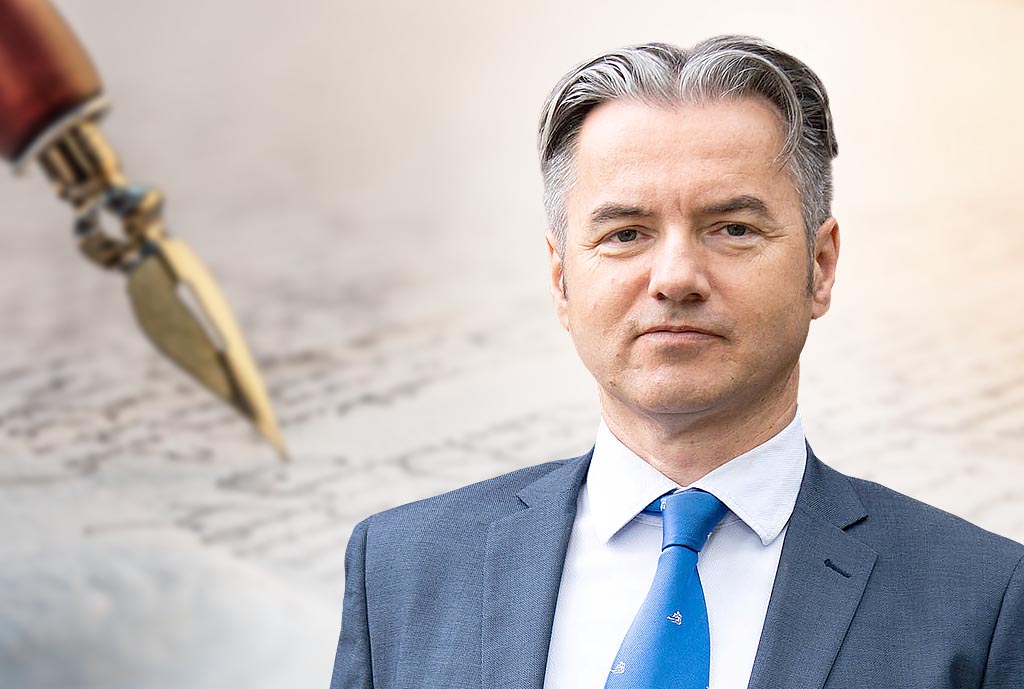By: Dr Metod Berlec
As anticipated, the political autumn is becoming increasingly lively. Last week, Prime Minister Robert Golob’s visit to the White House to meet with outgoing President Joe Biden made waves. For Golob, the visit served as a balm on a stinging wound dealt by the police, who filed a criminal complaint against him with the Specialised State Prosecutor’s Office. This action has effectively placed a noose around his neck, one that can be tightened if necessary.
Golob is thus becoming a “political corpse,” as they say in political jargon, much like Joe Biden, who, due to declining cognitive abilities, was reportedly forced by American Democrats at the beginning of the summer to step back from the presidential race. He has since been replaced by Vice President Kamala Harris, who will face Republican Donald Trump in the U.S. presidential election on November 5th. For Golob and his partner Tina Gaber, the visit to Washington was primarily a prestigious, promotional opportunity. Biden thanked Golob for Slovenia’s role in a spy exchange earlier this summer, and they discussed cooperation in various fields. According to the White House statement, they spoke about “collaboration in clean energy and advanced technologies,” confirmed their “unwavering support for Ukraine as it continues to defend itself against Russian aggression,” and discussed recent events in the Middle East, where there are notable differences between the two nations. Slovenia, under Golob’s administration, is perceived as supportive of Islamic militants (acting as proxies for Iran’s theocratic regime) whose aim is the destruction of Israel, whereas the U.S. provides virtually unconditional support to Israel in this longstanding regional conflict.
On the other side, SDS President Janez Janša shared a scenario on the social platform X, which he claimed has been orchestrated by powerful figures in the background. According to Janša, this strategy is intended to “shorten the suffering of the Golob coalition” while simultaneously preventing the establishment of a centre-right development-oriented government. He suggests that a media monopoly is being used to dismantle the Gibanje Svoboda party and weaken SDS party. Votes from the Gibanje Svoboda are to be redirected to the Vesna party and/or a “new face” like Vladimir Prebilič. Meanwhile, they will attempt to siphon votes away from SDS to the new party of Anže Logar, replicating tactics used in 2011 with Janković and Virant. As part of this strategy, the advisory referendum on the second reactor at the Krško Nuclear Power Plant (JEK 2) is being framed as a corrupt affair “involving both the left and right, especially GS and SDS.” This is being driven by a “paramilitary” of NGOs, like the campaign used in the water referendum. According to Janša, the timeline – which could of course be adapted – looks like this:
November 2024: 1. In the campaign, the referendum is being undermined, with the party VESNA and/or Vladimir Prebilič emerging as the central force AGAINST it. 2. The conviction of Zoran Janković at the first instance in one of the cases, intended to create the impression of equal standards. 3. An escalation of PR pressure by Nataša Pirc Musar on the government and the beginning of the Social Democrats’ (SD) distancing from the coalition. December 2024: 1. An escalation of media pressure on parties (primarily GS and SDS) that supported the referendum on the Nuclear Power Plant (JEK 2). 2. First-instance conviction of the SDS president in the Trenta case. January 2025: 1. Formation of Anže Logar’s party with significant media coverage. 2. Official announcement by Vladimir Prebilič of his candidacy. 3. Filing of charges against Robert Golob, exit of SD from the coalition, collapse of the government, and start of the process for either forming a new government or calling early elections. February 2025: 1. Failed attempt to form a new government. 2. Escalating healthcare crisis with extensive media coverage of the critical state. 3. Call for early parliamentary elections. March 2025: 1. Election campaign with media promotion of Prebilič and Logar. 2. Second-instance confirmation of the SDS president’s conviction (final ruling). April 2025: Early parliamentary elections in the National Assembly of the Republic of Slovenia.
Janša claims that there is ample evidence and indicators supporting this narrative. Notably, the main media outlets have, without clear reason, resurrected discussions on the controversial state-led investment TEŠ 6, comparing it with JEK 2, while consistently framing it as a project of both the left and the right. Simultaneously, “depoliticised” RTV has systematically launched a campaign to oppose the JEK 2 referendum. The President of Slovenia has proposed Tone Rop as governor of the Bank of Slovenia, rather than the coalition-supported candidate Saša Jazbec. Milan Kučan reportedly visited Zoran Janković and informed him of his impending conviction. “Collateral damage, that is all. But do not worry about the second instance.” Anže Logar made a high-profile exit from SDS a few days after a source from the top of the judiciary reportedly informed him that the police had filed or would be filing criminal charges against Golob. During a flood of media appearances, he also misspoke, stating on camera that “his main goal is to prevent the formation of a centre-right government.” At the same time, major media outlets are now trying to equate the largest governing party with the largest opposition party. /…/ “Suddenly, everyone is the same, and everyone is bad. That is why we need a new ‘new face’.”

